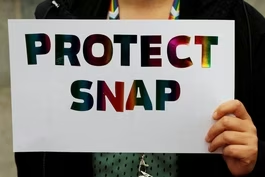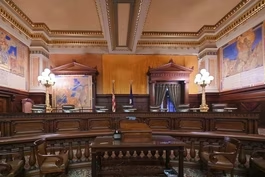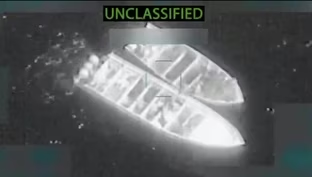
Ex-Trump official: Pressure to end shutdown ramps up Nov. 1
Clip: 10/28/2025 | 5m 43sVideo has Closed Captions
Pressure to end shutdown ramps up on Nov. 1, ex-Trump White House official says
As the federal government shutdown continues, Geoff Bennett discussed political implications and how to resolve it with former White House Director of Legislative Affairs Marc Short. He led President Trump’s congressional negotiating team nearly seven years ago during the 35-day shutdown, the longest ever.
Problems playing video? | Closed Captioning Feedback
Problems playing video? | Closed Captioning Feedback
Major corporate funding for the PBS News Hour is provided by BDO, BNSF, Consumer Cellular, American Cruise Lines, and Raymond James. Funding for the PBS NewsHour Weekend is provided by...

Ex-Trump official: Pressure to end shutdown ramps up Nov. 1
Clip: 10/28/2025 | 5m 43sVideo has Closed Captions
As the federal government shutdown continues, Geoff Bennett discussed political implications and how to resolve it with former White House Director of Legislative Affairs Marc Short. He led President Trump’s congressional negotiating team nearly seven years ago during the 35-day shutdown, the longest ever.
Problems playing video? | Closed Captioning Feedback
How to Watch PBS News Hour
PBS News Hour is available to stream on pbs.org and the free PBS App, available on iPhone, Apple TV, Android TV, Android smartphones, Amazon Fire TV, Amazon Fire Tablet, Roku, Samsung Smart TV, and Vizio.
Providing Support for PBS.org
Learn Moreabout PBS online sponsorshipGEOFF BENNETT: For more on the shutdown's political implications, we're joined now by former White House Director of Legislative Affairs Marc Short.
He led President Trump's congressional negotiating team nearly seven years ago during the longest ever shutdown.
That was 35 days.
It's good to see you.
MARC SHORT, Former White House Director of Legislative Affairs: Thanks for having me.
GEOFF BENNETT: So, in this current moment, Republicans are calling for an extension of the current budget.
Democrats want an extension of the Obamacare tax credits.
Both sides are dug in.
Do you think both sides in many ways have sort of boxed themselves in?
How do you see this resolving?
MARC SHORT: I don't know if it's so much they have boxed themselves in as much as it is that I think there's not as much incentive for either side to end it right now.
Traditionally, I think that Republicans have been the ones that have triggered shutdowns.
And in many cases, they didn't want to fund the government.
They wanted to use that as leverage to get some other legislative priority.
Typically, they failed in those efforts.
I think what's different this time is Democrats, the ones who've initiated the shutdown, didn't want to fund the government as it is because they want to extend the Obamacare subsidies.
I think they feel, the closer we get to November 1, they will win when those premiums are announced, they go up.
And I think for Republicans, they feel like, why are we going to be pushed into having to negotiate with ourselves when we have already passed the bill to fund the government and even funded at Biden levels?
They're not cutting funding.
They're actually keeping it at Biden levels.
And so they don't have the incentive.
I'd say the third piece of this is, honestly, I think the White House sees the president traveling to Asia.
They have seen him have a hostage deal in the Middle East.
And he's dealing with international issues that kind of seem to be rising above the dysfunction of Congress.
So they don't have much of an incentive either, whereas, in 2018, as you know, President Trump claimed credit for the shutdown.
And so he pretty much had an onus to get it fixed, whereas, right now, I don't think that's the case.
GEOFF BENNETT: I heard you say on "Meet the Press" a few weeks ago you think Republicans will ultimately cave on this health care issue.
Do you still think that's the case?
And if so, why not cut that deal now?
MARC SHORT: I think that they ultimately will extend the Obamacare subsidies.
I think that, from a policy perspective, I think that when Democrats passed Obamacare, they were smart to include the subsidies because it creates an incentive to need to keep funding it.
And I think Republicans have failed to their efforts to create a different health care system or to repeal Obamacare.
I wish that they would come forward with more free market reforms, rather than continuing to fund a program that is failing.
Having said that, I just think that the dynamic in their district is they don't want to be blamed for people having their premiums increase, and so there's enough Republicans that will cross over and support it.
As far as why not do it now as part of the government shutdown, it's, again, I think they feel like why would it reward bad behavior on the Democrats?
They're the ones that forced the shutdown.
We agreed to fund the government.
Almost every single Republican except for one in the House and the Senate voted for it.
And every single Democrat except for one in the House and one in the Senate voted to oppose government funding.
So they feel like, why should we bail Democrats out of this?
This is their mess.
GEOFF BENNETT: Is that message landing, do you think, the Republican argument that, even though they control every lever of power in Washington, that this is somehow a Democrat shutdown?
MARC SHORT: I'm not sure.
I'm not sure that either message is really landing.
I think for a lot of Americans, they view it as kind of dysfunction of Congress at this point.
I think they have become somewhat numb to these shutdowns.
I think it's kind of a pox on both houses.
And as we were discussing off air, I think the president creates some of the different news cycles every week that is hard for them to drive as much attention to the government shutdown currently.
And so I'm not sure that either message is really resonating currently.
I think it's kind of a mix for most Americans.
GEOFF BENNETT: Yes, let's talk more about that.
I mean, what does it say in this moment that the shutdown is entering week five, and unless people are directly affected by it, there seems to be this sense of indifference?
MARC SHORT: I think there is a lot of indifference.
Again, I think Americans would come kind of numb to having these shutdowns in the past.
I feel like the pressure points will come around November 1.
There's multiple things happening at that point.
One is the insurance premiums get announced for those on those plans.
But second, there's SNAP funding.
The food stamp program runs out of funding.
But I think as well, at that point, there's going to be a lot more pressure to say we have to solve this for our constituents.
And so I think the November 1 deadlines, there's a lot of programs.
And we have begun to see air traffic controllers not show up.
And I think as more and more people get inconvenienced on travel, all those things are kind of coming together over the next week.
GEOFF BENNETT: And that was a real issue back in 2018-2019.
That was the thing that ultimately forced the hands of lawmakers and the president to get in the room and to get the government funded was the fact that you had air traffic controllers facing frustration.
They were overworked.
They were calling in sick.
And it created long lines and delays and security issues.
MARC SHORT: Look, I think that, for Republicans in many occasions that we have triggered shutdowns is to try to placate a certain constituency in your base that is frustrated.
I even remember, back in 2013, there was a rising sense that Republicans weren't saying enough to Obama administration and to Obamacare.
And that caused much of the shutdown.
I think, in this case, Democrats are pushing this for a similar reason, where it wasn't really about the government funding.
It was a feeling that Schumer went along with this.
They wanted Democrats to stand up to President Trump, and they triggered this.
And so you have sort of these other reasons that are less related to actually the government funding bill.
And so ultimately it does cause those other sort of inconveniences that forces members of Congress to actually find a solution.
GEOFF BENNETT: Do you think this becomes the longest shutdown on record?
MARC SHORT: I think it'll be close.
I do feel like this is probably about another week out.
Again, I think there's so many things converging on November 1 that that's going to force action.
GEOFF BENNETT: Marc Short, always good to speak with you.
MARC SHORT: Thanks for having me.
A Brief But Spectacular take on preventing homelessness
Video has Closed Captions
Clip: 10/28/2025 | 3m 32s | A Brief But Spectacular take on preventing homelessness (3m 32s)
Dodgers, Blue Jays set World Series records in marathon game
Video has Closed Captions
Clip: 10/28/2025 | 9m 10s | Dodgers and Blue Jays break World Series records in marathon 18-inning game (9m 10s)
Gaza ceasefire tested as Israel launches strikes on Hamas
Video has Closed Captions
Clip: 10/28/2025 | 3m 50s | Gaza ceasefire tested as Israel launches strikes after it says Hamas attacked soldiers (3m 50s)
Hurricane Melissa slams into Jamaica as a Category 5 storm
Video has Closed Captions
Clip: 10/28/2025 | 10m 39s | Hurricane Melissa slams into Jamaica as a Category 5 with 185 mph winds (10m 39s)
Millions face losing SNAP benefits as shutdown continues
Video has Closed Captions
Clip: 10/28/2025 | 7m 35s | Millions face losing SNAP benefits as shutdown continues with no end in sight (7m 35s)
National implications of Pennsylvania's Supreme Court race
Video has Closed Captions
Clip: 10/28/2025 | 5m 17s | Why Pennsylvania's Supreme Court election has national implications (5m 17s)
News Wrap: U.S. strikes boats in Pacific, killing 14
Video has Closed Captions
Clip: 10/28/2025 | 5m 5s | News Wrap: U.S. strikes alleged drug boats in Pacific, killing at least 14 (5m 5s)
Providing Support for PBS.org
Learn Moreabout PBS online sponsorship
- News and Public Affairs

FRONTLINE is investigative journalism that questions, explains and changes our world.

- News and Public Affairs

Amanpour and Company features conversations with leaders and decision makers.












Support for PBS provided by:
Major corporate funding for the PBS News Hour is provided by BDO, BNSF, Consumer Cellular, American Cruise Lines, and Raymond James. Funding for the PBS NewsHour Weekend is provided by...






